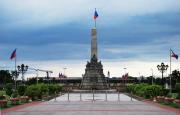Overview
There are four settlements namely: Dinigman Settlement at Barangay Canaway, Lamutan Settlement at Barangay Lamutan, Tamala Settlement at Barangay San Marcelino, and Cynthia Village of Barangay Umiray. These settlements are under the administration and supervision of the Local Government, Office for Southern Cultural Communities (OSCC) of the Department of Social Welfare and Development.
Location
Sitio Malatunglan, General Nakar, Quezon Province.
Dumagat Tribe
The term Dumagat may have been derived from the word “Gubat” (forest) and “Hubad”. The more logical origin of its name is “Taga-dagat” which means "sea gypsies". They typify the outstanding Negrito physical traits of dark brown to black complexion and curly hair. The few cases of straight hair and light complexion may be chiefly the result of mixture with lowland Christians.
Culture
The Dumagat people are of the Agta Negrito groups found in Luzon. In the past, these people lived in coastal areas of Aurora and Quezon provinces and were lords in their own domain. However, because of the coming of Filipino homesteaders in the Agta area, they were pushed into the mountains, and dispersed in small groups.
Dumagats are semi-nomadic. They move from place to place in search of better habitation. Recently, they have learned to live in permanent settlements. They are reported found scattered in different locations. They are also divided into six dialects.
The Kabulowan are one of the subgroups of the Dumagat (also known as '"Baluga").
Dumagat families are generally simple nuclear family. They live in extended family groupings. If conflicts arise among themselves, they just move away.
In the past, men wore a cloth of the G-string and the women wore wrap around skirts. Now, they wear used, machine sewed lowland clothes.
Religion
The Dumagats are animist. Practices and beliefs differ from person to person. Dumagat animism has less control over the people's daily lives. In addition, they have adopted some of the beliefs of their Christian neighbors. Now, they hold to a universal belief in a single God, maybe a result of Christian influence. Cultish groups are also working in the area.









